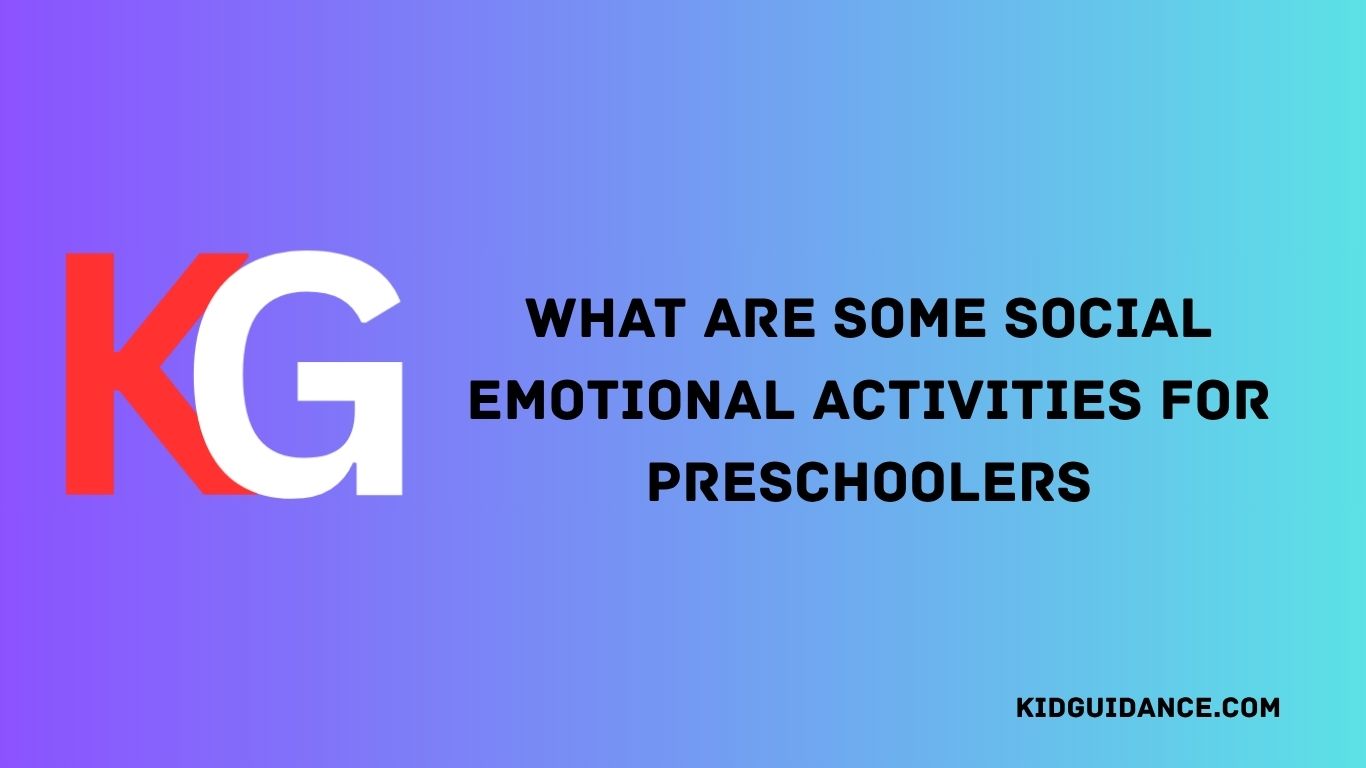As parents, we all want our preschoolers to grow up with strong emotional skills. But you may wonder, what are some social-emotional activities for preschoolers? I’ve been there, feeling unsure about where to start. That’s why I’m here to share simple and fun activities that help children understand their feelings, build friendships, and become more empathetic. These activities aren’t just for the classroom—they can be done at home, too! Let’s explore some easy ways to help your little one grow emotionally strong, all while having fun together.
I’ve witnessed firsthand the transformative power of social-emotional activities in the classroom and at home. For instance, when my child practiced mindful breathing, I noticed a dramatic improvement in their ability to calm down after a meltdown. These moments were not just teachable—they were transformative.
What Are Social Emotional Activities for Preschoolers?
Social-emotional activities for preschoolers are designed to help children understand and express their emotions, develop empathy, and improve social skills. These activities play a crucial role in a child’s overall well-being, laying the foundation for their future emotional and social success.
Social-emotional learning helps children build the necessary skills to regulate their emotions, connect with others, and solve problems effectively. By engaging in these activities, preschoolers learn essential skills such as:
- Self-awareness: Recognizing and naming emotions.
- Emotional regulation: Managing feelings in healthy ways.
- Empathy and perspective-taking: Understanding others’ feelings and responding appropriately.
- Social skills: Communication, collaboration, and conflict resolution.
One activity I used to try in my classroom involved creating an emotion chart, where children could point to the emotion they felt. This simple act made children more aware of their feelings and allowed them to express themselves in a non-verbal way, fostering better communication.
What Are the Activities That Can Be Used for Social-Emotional Development?
1. Emotion Charades
Emotion charades is a fun activity that helps children recognize and express emotions through role-play. Kids take turns acting out different emotions like happiness, sadness, or anger, while others guess the emotion. This activity enhances children’s emotional literacy and helps them understand the non-verbal cues associated with different feelings.
Related Keyword: What are the social emotional skills of a 4-year-old?
By acting out emotions, children learn to better identify and express how they feel, a vital social-emotional skill for preschoolers.
2. Feelings Thermometer
A feelings thermometer is a visual tool that helps children gauge how strong their emotions are. By using a thermometer with different levels (e.g., calm, upset, angry), kids can point to where they are on the scale. This helps children understand how their emotions escalate or de-escalate, giving them tools to regulate their feelings.
This tool is especially useful both in home and classroom settings. For example, when transitioning from playtime to cleanup, the thermometer can visually remind children of the time left to finish their task, helping manage any frustration they may feel.
3. Emotion Masks
Creating and acting out emotions with masks is another great activity for preschoolers. Children can decorate masks with different facial expressions, then use them to role-play different emotional scenarios. This helps develop empathy and understanding of how others might feel in certain situations.
4. Mindful Breathing
Mindful breathing activities, such as bubble blowing or deep breathing exercises, are effective in teaching children how to regulate their emotions. These techniques help children calm themselves when they’re upset or overwhelmed. By using mindfulness, preschoolers develop greater emotional control, which is an essential skill for social interactions.
How to Teach Social Emotional Learning to Preschoolers?
Start with Conversations About Emotions
The first step in teaching social-emotional learning is having ongoing conversations with children about their emotions. Help them identify and label how they feel by using simple language like “Are you feeling happy or sad?” This step is fundamental in teaching preschoolers how to understand their own emotional states.
Related Keyword: How to teach social emotional learning to preschoolers?
I’ve found that when children are encouraged to talk about their emotions regularly, they become more comfortable discussing their feelings, which enhances emotional intelligence.
Modeling Emotional Responses
Children learn by example. When we, as adults, model how to express and manage our emotions, we teach children how to do the same. For instance, if I’m feeling frustrated, I might say, “I’m feeling upset right now, but I’m going to take a deep breath to calm down.” This simple act helps children see how they can respond to their own feelings in a healthy way.
Personal Experience:
I once had a difficult day where my patience was tested. Instead of hiding my frustration, I expressed it calmly to the children, explaining that it’s okay to feel upset but important to handle it with respect. This sparked a conversation, and the children were more open about expressing their own frustrations.
Using Books and Stories
Books are a great way to teach preschoolers about emotions, empathy, and social relationships. Reading stories with characters facing challenges helps children understand different emotional experiences and learn strategies for coping.
Some of my favorite books to use are The Color Monster by Anna Llenas (to help with identifying emotions) and Have You Filled a Bucket Today? by Carol McCloud (which promotes kindness and empathy).
Fun Social and Emotional Activities for Preschoolers
1. The “Feelings” Collage
A feelings collage is an activity where children cut out pictures of different emotions from magazines or create their own drawings. This activity not only helps children label emotions but also engages them in fine motor skills as they cut and paste.
Related Keyword: What are some social and emotional activities for toddlers?
Toddlers can also enjoy this activity by using simpler images or stickers to represent emotions. It’s a fun way to start conversations about feelings.
2. Playdough Emotion Faces
Playdough is an excellent tool for creativity and emotional learning. Have children mold playdough into faces that represent different emotions. This activity combines fine motor skills with emotional expression and is an engaging way to discuss feelings with young children.
3. Empathy Role-Playing
Empathy role-playing helps children understand how others might feel in different situations. For instance, you can set up scenarios where one child pretends to be sad, and the other practices offering comfort. This helps children practice perspective-taking and build emotional awareness.
Related Keyword: What are some social emotional activities for preschoolers?
This activity encourages children to step into others’ shoes, promoting kindness and emotional understanding.
Social Emotional Skills of a 4-Year-Old
At the age of 4, preschoolers are typically developing crucial social-emotional skills, such as recognizing their own feelings and beginning to understand others’ emotions. Key milestones include:
- Sharing and turn-taking
- Recognizing emotions in themselves and others
- Using words to express their feelings
- Showing empathy for peers
Personal Experience:
I once observed a 4-year-old who initially struggled with sharing. Through activities that involved turn-taking and cooperative games, I noticed significant progress in the child’s ability to share and understand others’ feelings.
These activities lay the foundation for emotional regulation, empathy, and collaboration—all essential skills for later life.
How Social Emotional Learning Helps Children Later in Life
Strong social-emotional skills in preschool help children succeed in school, develop healthy friendships, and navigate challenges in life. These skills also serve as the cornerstone for future emotional intelligence, influencing their ability to build relationships, resolve conflicts, and manage stress as they grow older.
Developing emotional intelligence early on ensures that children can approach challenges with a calm and thoughtful mindset, leading to greater success in academics, social situations, and eventually in their careers and personal lives.
Conclusion
Social-emotional activities for preschoolers are not just fun—they are essential for emotional and social growth. Activities like emotion charades, mindful breathing, and empathy role-playing provide young children with the tools they need to understand their feelings, relate to others, and build meaningful relationships. As parents and educators, it’s crucial to integrate these activities into daily routines, ensuring that children grow up with the emotional intelligence to thrive.
FAQs
What Are Some Social Emotional Activities for Preschoolers?
Social emotional activities for preschoolers help children understand their feelings and build empathy. Simple games, art projects, and conversations about emotions are great ways to engage them.
How Do Social Emotional Activities Help Preschoolers?
These activities teach kids how to manage emotions, improve social skills, and develop empathy. They promote emotional intelligence, which is essential for building healthy relationships.
What Are the Best Social Emotional Activities for Preschoolers?
Some effective activities include Emotion Charades, Feelings Thermometers, and creating Emotion Masks. These activities help children express and understand emotions while having fun.
How Can I Teach Social Emotional Learning to Preschoolers?
To teach social emotional learning, start by talking about emotions. Use games, books, and role-playing to help children recognize and express their feelings in a safe space.
What Are the Social Emotional Skills of a 4-Year-Old?
At age 4, children develop skills like sharing, turn-taking, recognizing feelings, and showing empathy. These skills are foundational for positive social interactions in preschool and beyond.
What Are Some Social and Emotional Activities for Toddlers?
Toddlers benefit from activities like simple emotion games, storytelling, and modeling emotional responses. These activities help them understand their feelings and learn empathy.
How Can I Encourage My Preschooler to Express Their Emotions?
Encourage your preschooler by creating a safe environment to talk about their feelings. Activities like drawing or role-playing can help them express emotions more freely.
Why Are Social Emotional Activities Important for Preschoolers?
These activities are crucial because they lay the foundation for a child’s emotional well-being. They help preschoolers develop coping strategies, form friendships, and build self-regulation.
How Can Books Help Preschoolers with Social Emotional Learning?
Books are a great tool to teach kids about emotions, friendship, and empathy. Reading stories about characters facing emotional challenges can help children understand and relate to feelings.
What Are Some Easy Social Emotional Activities for Preschoolers at Home?
At home, you can try simple activities like feeling face cards, discussing daily emotions, or practicing deep breathing together. These activities build emotional intelligence in an easy, engaging way.




